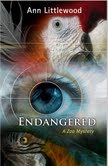Hey, Let Go of My Shirt, Writer-Lady!
By Ann Littlewood
 What motivates a person to put their head down and slog away until they’ve written a novel and then persist through the hassle of getting it published? It could be the hope of fame and fortune. Could be for fun—the challenge of plotting and writing, seeing one’s name in print, contact with an audience. Could be all that and more.
What motivates a person to put their head down and slog away until they’ve written a novel and then persist through the hassle of getting it published? It could be the hope of fame and fortune. Could be for fun—the challenge of plotting and writing, seeing one’s name in print, contact with an audience. Could be all that and more.
About the more… I write zoo mysteries for D) all the above, plus the joy of researching the animals and issues. And for another reason: the opportunity to nudge you, gentle reader, toward caring about the natural world and even (a girl can dream) Doing Something to help it out.
Fiction writers debate rather fiercely whether interjecting a strongly-felt world view (AKA, an opinion) into a novel is ever justified. Objections include that this detracts from the story and reduces its entertainment value. People won’t like it; the book won’t succeed. Put that stuff in a blog or an op-ed piece instead.
I’m convinced that no one can write so much as a grocery list without incorporating their personal life lessons, cultural underpinnings, and assumptions both conscious and un-. Or limitations, prejudices, and opinions, to use the pejoratives. This is easily visible in fiction that has aged several decades or a century or two, whether the work is serious literature or light-hearted foolery. Look for attitudes toward women, religions and races, animals, and the poor.
We write from our hearts and minds, and hearts and minds are human. We don’t shed culture and experience when we pick up a pen or sit down at the computer. For the few of us lucky enough to have readers decades or a century from now, those readers will shake their heads at the assumptions we don’t even know we are putting into our work.
Personally, I take this as a license to steal. I’ve got opinions a-plenty, and I want to exact all possible benefit from the hard work of hammering out what I desperately hope is an exciting, compelling, entertaining mystery novel.
I’m hardly the first to incorporate issues into crime fiction. Other authors go well beyond “crime doesn’t pay.” Sara Paretsky and Laura Lippman both tackle economic and racial injustice, as does Walter Mosley. In his Dr. Suri series, Colin Cotterill shows the otherwise-inexplicable attraction communism has to Laotians. Larry Karp incorporates the ethical storm around the first test-tube babies in A Perilous Conception.
One of my life lessons is to abstain from behavior I know for sure is stupid (easier said than done, right?). I really do try to be subtle instead of preachy. I whip up an “author’s afterword” for the heavy lifting and aim for a lighter hand elsewhere. Nobody likes preaching in their escapism unless they already agree, and what’s the point of that?
What I’m passionate about, what I need to keep in hand, is that our planet is everywhere undergoing rapid change thanks to human activity. This is working out badly for most of the species we share it with. It’s not working out all that well for us, either. My thesis is that if you enjoy the natural world and know a little about it, you will notice when it’s being trashed and (this is the prayer part) Do Something to make that stop—contact the powers that be, donate to conservation organizations, temper your own behavior.
With a zoo mystery, writing about the natural history of specific animal species is a no-brainer. With zoo keeper characters, writing dialog that explains the basics of a conservation issue is a natural. With crimes that involve wildlife, writing scenes that point the way to individual action is… a little tougher.
No one has yet lambasted my novels for any of this, so my courage grows with each book in the series. I do what I can to grow my skills as a novelist, too, but I’m not the one to judge that. You, the reader, would be the judge. Like every author, I really, really want you to enjoy my books and tell all your friends. But even more—way more—I’d like you to be inspired to Do Something.
 Ann Littlewood worked as a zoo keeper at the Oregon Zoo for 12 years before launching a career in business writing with Kaiser Permanente. A founding member of the Oregon Zoo chapter of the American Association of Zoo Keepers, Ann lives in Portland, Oregon. A life-long environmentalist, Ann is an active volunteer with the Audubon Society of Portland and other conservation organizations. She is also the author of Night Kill and Did Not Survive.
Ann Littlewood worked as a zoo keeper at the Oregon Zoo for 12 years before launching a career in business writing with Kaiser Permanente. A founding member of the Oregon Zoo chapter of the American Association of Zoo Keepers, Ann lives in Portland, Oregon. A life-long environmentalist, Ann is an active volunteer with the Audubon Society of Portland and other conservation organizations. She is also the author of Night Kill and Did Not Survive.
Visit Ann Littlewood online at: www.zoomysteries.com

